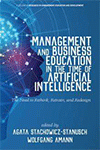
Management and Business Education in the Time of Artificial Intelligence
The Need to Rethink, Retrain, and Redesign
Edited by:
Agata Stachowicz-Stanusch, Canadian University Dubai
Wolfgang Amann, HEC Paris
A volume in the series: Research in Management Education and Development. Editor(s): Agata Stachowicz-Stanusch, Canadian University Dubai. Wolfgang Amann, HEC Paris. Hamid H. Kazeroony, North-West University Business School.
Published 2020
Artificial intelligence (AI) technologies are one of top investment priorities in these days. They are aimed at finding applications in fields of special value for humans, including education.
The fourth industrial revolution will replace not only human hands but also human brains, the time of machines requires new forms of work and new ways of business education, however we must be aware that if there is no control of human-AI interaction, there is a risk of losing sight of this interaction’s goal. First, it is important to get people to truly understand AI systems, to intentionally participate in their use, as well as to build their trust, because “the measure of success for AI applications is the value they create for human lives” (Stanford University 2016, 33). Consequently, society needs to adapt to AI applications if it is to extend its benefits and mitigate the inevitable errors and failures. This is why it is highly recommended to create new AI-powered tools for education that are the result of cooperation between AI researchers and humanities’ and social sciences’ researchers, who can identify cognitive processes and human behaviors.
This book is authored by a range of international experts with a diversity of backgrounds and perspectives hopefully bringing us closer to the responses for the questions what we should teach (what the ‘right’ set of future skills is), how we should teach (the way in which schools should teach and assess them) and where we should teach (what implications does AI have for today’s education infrastructure). We must remember as we have already noticed before “...education institutions would need to ensure that that they have an appropriate infrastructure, as well as the safety and credibility of AI-based systems. Ultimately, the law and policies need to adjust to the rapid pace of AI development, because the formal responsibility for appropriate learning outcomes will in future be divided between a teacher and a machine. Above all, we should ensure that AI respect human and civil rights (Stachowicz-Stanusch, Amann, 2018)”.
CONTENTS
Acknowledgements. About the Editors & Authors. PART I: INTRODUCTION. The Time of Artificial Intelligence in Management Education: What We Should Teach, How We Should Teach and Where We Should Teach? Wolfgang Amann, Agata Stachowicz-Stanusch. PART II: IMPACT OF MACHINES, ROBOTS AND ARTIFICIAL INTELLIGENCE ON BUSINESS AND MANAGEMENT EDUCATION. Artificial Intelligence in Business Management Education and Research: Ünsal Sığrı, Gamze Güner. Artificial Intelligence: from Business Schools to Management Schools, Jaime Barrera P., Rafael Bautista M., Gustavo Gonzalez C. Artificial Intelligence and Frugal Innovation – a Formidable Alliance in Future Education, Gerrit Anton de Waal, John Thangarajah, Adela J McMurray. The Case for Inclusion of Artificial Intelligence Governance in Business Management Education, Peter Yeoh. Robots and AI As Ways to integrate Education and Work Life, Antti Ainamo, Paula Lehto, Jaakko Porokuokka. PART III: TEACHING SKILLS THAT MACHINES AND ROBOTS CANNOT DO-THE CHALLENGE FOR BUSINESS AND MANAGEMENT EDUCATION. How Can We Reinvent Business Education? Applying the Professional Service Life-Cycle Perspective to AI-Enabled Learning, Jie J. Zhang, Benjamin Lawrence. Deconstructed Education: The Usefulness of Smart Teaching, Davide de Gennaro, Andrea Tomo, Lucio Todisco. Educating Business Students for the Age of Intelligent Machines: A Framework for On-line AI-enabled Learning, James F. Fairbank, William E. Spangler, Bonnie Morris. Artificial Intelligence and Executive Development, Danica Purg and Arnold Walravens. When Artificial Intelligence Meets Augmented Reality - Implications for Management and Business Education, Nakul Gupta and N P Singh. Artificial Intelligence and the Learning Experience: The Impact of Augmented and Virtual Reality on Teaching and Learning, Kathryn Woods.
-
Paperback978-1-64113-809-3
Web price: $45.04 (Reg. 52.99)
-
Hardcover978-1-64113-810-9
Web price: $80.74 (Reg. 94.99)
- eBook978-1-64113-811-6

- BUS042000 - BUSINESS & ECONOMICS: Management Science
- BUS106000 - BUSINESS & ECONOMICS: Mentoring & Coaching
- BUS108000 - BUSINESS & ECONOMICS: Research & Development
-
 Advancing African Knowledge Management and Education
Advancing African Knowledge Management and Education
-
 Anti-Corruption in Management Research and Business School Classrooms
Anti-Corruption in Management Research and Business School Classrooms
-
 Emerging Web 3.0/Semantic Web Applications in Higher Education
Growing Personalization and Wider Interconnections in Learning
Emerging Web 3.0/Semantic Web Applications in Higher Education
Growing Personalization and Wider Interconnections in Learning
-
 Humanistic Values from Academic Community Perspective
Humanistic Values from Academic Community Perspective
-
 Phronesis in Business Schools
Reflections on Teaching and Learning
Phronesis in Business Schools
Reflections on Teaching and Learning
-
 Principles of Responsible Management Education (PRME) in the Age of Artificial Intelligence (AI)
Opportunities, Threats, and the Way Forward
Principles of Responsible Management Education (PRME) in the Age of Artificial Intelligence (AI)
Opportunities, Threats, and the Way Forward
-
 The Ph.D. Mindset
Decoupling Passion from Research
The Ph.D. Mindset
Decoupling Passion from Research

